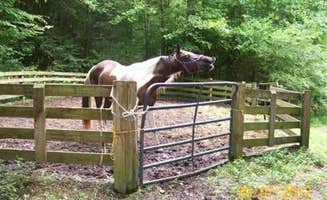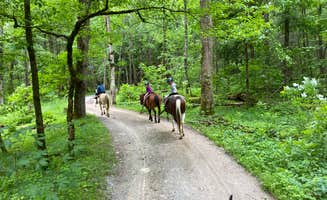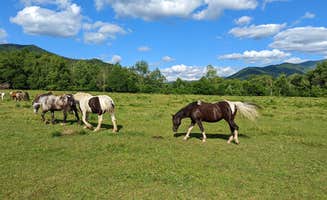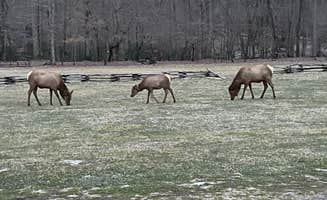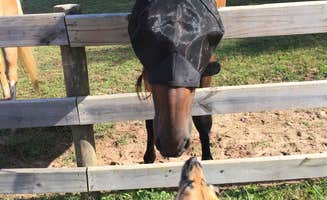Equestrian camping near Tallassee, Tennessee offers access to over 100 miles of bridle trails within Cherokee National Forest at elevations ranging from 800 to 5,000 feet. The area receives approximately 55 inches of annual rainfall, creating lush forest conditions and moderate temperatures that average 55-85°F in summer and 25-45°F in winter. Tallassee's position at the foothills of the Smoky Mountains provides horse campers with diverse terrain options ranging from riverfront paths to mountain ascents.
What to do
Trail riding with varied difficulty levels: Cades Cove Campground connects to the Cades Cove scenic loop, which closes to vehicle traffic on certain days. "The campground is beautiful and on certain days they close off the loop of Cades Cove for bicycles to be able to ride," notes Jeremy H., adding that riders can rent bikes from the nearby store for reasonable rates.
Wildlife viewing from horseback: The open meadows around Tsali Campground provide excellent wildlife spotting opportunities. "I have never seen more black bear. It was a very safe distance we watched them about a football field away across a field pretty amazing experience," says Ashley Y. from her visit to the area.
Water access for horse cooling: Many trails intersect with creeks and river access points. "The Little River runs behind it. Go tubing!!! So much fun," recommends Cathy O. about the waterways near Townsend. These water access points serve as natural cooling stations for horses after strenuous rides.
Historical trail exploration: Several equestrian trails lead to preserved historic structures. "Go on the car tour loop and make sure to stop and look at the cabins and church. History at its finest," suggests Buck R., highlighting the cultural aspects accessible via horseback.
What campers like
Horse-specific amenities: Young Branch Horse Camp provides dedicated facilities for equestrians. "Located in between campsites 7&8, Young Branch is the more 'civilized' part of Citico Creek. There is a toilet, but no hookups. About 6 different sites within the campground," explains Zane P., who appreciates the well-maintained sites.
Seasonal variations in trail conditions: Fall riding offers the most spectacular views. "November is when the leaves are changing. Temps cool at night, moderately nice during the day," notes Buck R., though he warns riders should be prepared for rapid weather changes as "got snow at Clingman's Dome however during the day!"
Proximity to mountain biking options: Tsali Campground provides additional recreation when not on horseback. "The Tsali system starts right from the campground. You can ride to & from your campsite and never have to load up," explains Tony C., referring to the mountain bike trails that share some routes with equestrian paths on alternating days.
Campground spacing and layout: Some equestrian camps offer more privacy than others. "The campsites are a good size as we were able to get several tents in one site," notes Tony C. about Tsali, making it suitable for group trail rides.
What you should know
Reservation requirements vary by season: Anthony Creek Horse Camp operates on a reservation system during peak months. The camp is available "April 1 to November 13" according to official information, with Robbie S. noting it has "easy access to the trails right from camp."
No pets policy at some horse camps: Anthony Creek Horse Camp prohibits dogs to prevent conflicts with horses. This restriction exists at several dedicated equestrian sites throughout the region.
Cell service limitations: "No cell service for Verizon and none for many miles on the drive to the site," warns Carol B. about the Cades Cove area, making it essential to download maps and trail information before arrival.
Campground gate hours: Some horse camps have restricted entry times. Kim L. notes that at Cades Cove, there's "the requirement to check in between 9-10:00 am the following day if one arrived later than check in time," which could impact your riding schedule.
Tips for camping with families
Beginner-friendly trail options: Gee Creek Campground offers gentle terrain for young riders. "A trail runs the perimeter of the camp and the Hiwasee River runs next to the campground. The campground also has a playground to keep kids entertained," says Anna M., highlighting features that complement equestrian activities.
Combined water-and-ride activities: During summer months, plan rides that incorporate swimming spots. "The Hiwasee River runs next to the campground," notes Anna M., providing cooling options for both horses and young riders.
Wildlife education opportunities: Morning rides offer the best wildlife viewing chances. "This is a very unique spot in the smokies. I have never seen more black bear," shares Ashley Y., though always maintain safe distances especially with children present.
Weather preparedness with children: Mountain weather changes rapidly. "It poured rain all weekend so we made a tarp city and squeezed all of our tents together," recalls Madison G. about adapting to conditions, a skill particularly important when camping with horses and children.
Tips from RVers
Horse trailer parking considerations: Toqua Beach Campground accommodates larger rigs with horse trailers. "They have gravel lots that are somewhat level. We stayed at site 104," reports Timothy T., adding that lake views enhance the camping experience for those with RVs and horse trailers.
Electric hookups for horse care equipment: Campers with electric needs should select appropriate sites. "This is a very clean, gated campground located right on the lake with available boat slips to rent during your stay... The sites are concrete and gravel," explains Allen S. about Toqua Beach, which offers 102 sites with water and electric hookups.
RV length restrictions on forest roads: Access to some equestrian camping areas requires navigating narrow mountain roads. "Long and windy road to get to the area," warns Aliy L. about reaching Cades Cove, a consideration when towing horse trailers with larger RVs.
RV leveling for horse loading/unloading: Proper setup ensures safe horse handling. "The sites on the North side of loop A are fairly uneven and would require a significant amount of leveling blocks if using a camper," cautions Gregg G. about certain campgrounds, a critical safety factor when loading and unloading horses.


